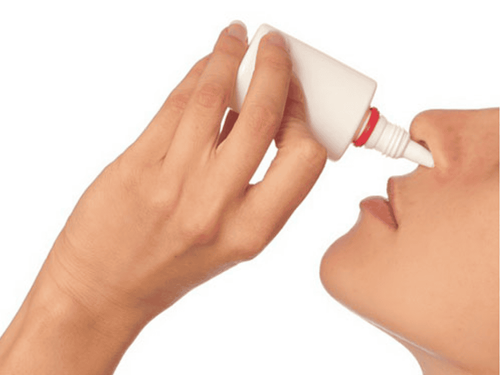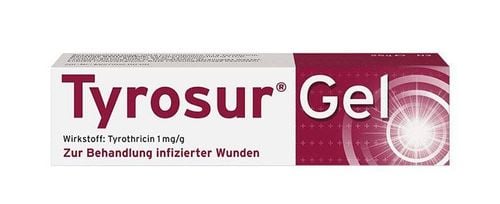This is an automatically translated article.
Allergic rhinitis and urticaria cause unpleasant symptoms, seriously affecting the patient's quality of life. Therefore, the use of drugs to improve and stop the above symptoms helps patients feel more comfortable. Civitadin is a common prescription drug that is useful in this situation. So, what does Civitadin do? Please refer to the article below for more information about this drug.
1. What is the effect of Civitadin?
Civitadin belongs to the group of anti-allergic drugs with the main ingredient is Desloratadine with a strength of 5 mg. In particular, Desloratadine is known as a second generation antihistamine anti-allergic-urticaria, reducing itching.
According to studies, using single or repeated doses of Desloratadine on histamine-induced urticaria in humans will produce an anti-histamine effect after 1 hour. This effect can last up to 24 hours. Desloratadine is rapidly absorbed and reaches maximum blood concentrations 3 hours after entering the body. The mean steady-state peak plasma concentrations (Cmax) and area under the concentration-time curve (AUC) were recorded at 4 ng/ml and 56.9 ng.hr/ml, respectively. Food and grapefruit juice had no effect on the bioavailability of desloratadine (Cmax and AUC).
Desloratadine is predominantly distributed in plasma proteins and this distribution is unchanged in patients with impaired renal function. Desloratadine is extensively metabolized to h 3-hydroxydesloratadine, which is then glucuronidated.
Thanks to the ingredient Desloratadine, Civitadin is effective in treating the symptoms of allergic rhinitis, year-round allergic rhinitis, namely sneezing, runny nose, stuffy nose, watery eyes, itchy throat. ,... This drug is also used to improve the symptoms of chronic idiopathic urticaria.
On the other hand, in order to use the drug safely and avoid affecting the patient's health, the drug is not allowed to be prescribed in the following cases:
The patient is allergic to any ingredient of the drug. Women who are pregnant or breast-feeding patients are also contraindicated to use the drug. Patients should note that the above contraindications are absolute. Therefore, if the patient belongs to the above group, it is necessary to inform the doctor.
2. Dosage and usage of Civitadin
2.1. How to use Civitadin is made in the form of capsules, so patients are recommended to take it orally. When taking the medicine, you should swallow the tablet whole, do not crush it.
The drug does not depend on food, so the patient can take it with or without a meal.
You should take the medicine with a lot of filtered or boiled water, do not use the drug with alcoholic drinks or fruit juices.
For intermittent allergic rhinitis, the doctor can recommend appropriate therapy, i.e. can stop the drug when the symptoms are completely improved or continue treatment when the disease recurs
2.2. Dosage The dose of the drug will be adjusted based on the age, condition of the patient or the purpose of treatment such as: allergic rhinitis, urticaria,... Specifically:
Usual dosage for children over 12 years old and adults are: 1-2 tablets/time/day. The usual dose for children 6-11 years old will be reduced by 1⁄2 doses compared to adults. The above dosage is for reference only, patients need to follow the instructions on dosage and use of the drug by the doctor.
Underdosing or overdosing can negatively affect drug action. This causes the drug to reduce the mechanism of action so that the symptoms of allergic rhinitis, urticaria are not completely stopped /
Therefore, in case of a missed dose, the patient should use it as soon as he remembers. If it is almost time for the next dose, skip the missed dose and take the next dose as scheduled.
Overdosing on drugs can cause symptoms similar to side effects and affect the patient's health. Patients should proactively notify their doctor if they find themselves using more than the recommended dose.
3. Civitadin side effects
Civitadin is well tolerated, however, during treatment, patients may still experience some side effects. Common Civitadin side effects tend to go away on their own after a few days or weeks. Meanwhile, serious reactions can develop and threaten the health of the user. With serious side effects, the doctor may order treatment to improve the situation. Specifically:
Rare side effects such as: fatigue, dry mouth, headache ... Patients very rarely experience signs of anaphylaxis or rash. Some undesirable side effects have been recorded such as seizures, increased liver enzymes, hepatitis and increased bilirubin... However, patients should not be too worried because these symptoms are very rare. . These are not all the side effects of Civitadin. Therefore, in the course of taking the drug, if any abnormal signs appear, which is suspected to be caused by the drug, you need to consult your doctor and receive timely treatment measures.
4. Civitadin drug interactions
Cilitadin can cause interactions by increasing peak plasma concentrations of erythromycin, ketoconazole, azithromycin, cimetidine... If the patient is taking these drugs or any other drugs, need to be seen and advised by a doctor or pharmacist. At the same time, in order to use the drug safely, the patient must not arbitrarily stop taking the drug or change the dose of the drug without the permission of the doctor.
Besides drug interactions, Civitadin may interact with alcohol and some soft drinks. As a result, Civitadin will increase side effects.
5. Preservation of Civitadin thuốc
Carefully read the instructions for storing the medicine on the box and read the instruction sheet for the medicine. Before using, check the expiry date of the medicine. When not in use, the drug should be collected and disposed of according to the instructions of the manufacturer or those in charge of the medical field. Store the medicine in a dry place, avoid direct exposure to sunlight or high temperature, it can convert the ingredients in the medicine. In summary, Citadin is recommended for the treatment of symptoms of allergic rhinitis and urticaria. . To ensure safety for health and maximize the effectiveness of treatment, patients need to take Civitadin exactly as directed by their doctor. Note, Citadin is a prescription drug, patients absolutely must not use it without a prescription from a specialist.













